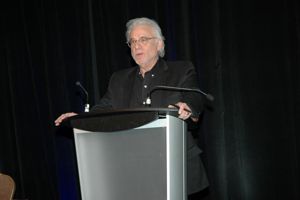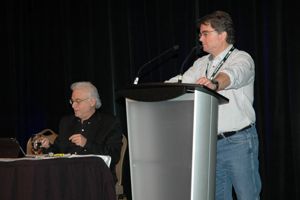The truth is no longer good enough
Date posted: January 10, 2018

Jeff Ansell
Jeff Ansell pulls back the curtain on media practices and pitfalls.
Jeff Ansell has worked both sides of the desk. First as an investigative journalist, then in public relations and marketing, he now uses all those experiences to counsel companies who need help managing their messages when dealing with media.
Ansell says today truth is not good enough. "Truth and perspective have become casualties of a media that does its research on the run, while it writes history in a hurry."
Media is looking for good versus evil in a story Ansell says. The grey area is complicated and most media outlets are not interested in complicated today. This unfortunate truth is played out again and again when agriculture's bad news stories make the headlines and the good news is left uncovered.
As well, consciously or not, reporters use a bit of a boiler plate when telling stories. The media creates "characters", and set up their questions to bring their narrative to life. The characters are generally a victim, a villain, and a hero as well as a witness, an expert and a village idiot.
"In livestock agriculture, the victim is often the animal and the villain is often the farm or producer. The hero is too often an activist group," says Ansell. The witness role may be filled by a disgruntled employee and the expert will tell you how things ought to be, such as a veterinarian or government regulator. "The village idiot is the one who got us into this mess or made the problem worse. And reporters often expedite the process by filling the roles of villain and village idiot with the same person.
"If today the 'Headline was You' – how much faith would place in the media to get your story right? Because unless the reporter works for trade media and understands the complexities of the industry, they are likely to be biased from the start." Ansell says dealing with media is a bit of "an unnatural dynamic that bears no resemblance to everyday conversation," but those in the industry should not be afraid to speak up.
He adds what many in the agriculture industry already know – that when in a battle between facts and emotions, emotions always win. The impact of emotion should not be underestimated. "Ignore it at your peril. It is an avalanche."

Ben Woolley, right, volunteer interviewee, and Jeff Ansell
A comparison of two Canadian meat crises – the XL Foods E.coli-related recall and Maple Leaf's listeria outbreak- illustrated what a difference addressing the issue and facing the media can make. "Every situation is different. But I will suggest that, more often than not, when bad news happens on your watch, you have to be among the most upset, the most aggrieved, the most outraged. You need to show your stakeholders you get it. And ideally, that would be genuine," says Ansell.
The value compass is a tool he uses to answer the question – What is the right thing to do? "The value compass reflects the words you would use to describe how you would like your stakeholders to view you. Words like honest, empathetic, accountable." He feels the compass is critical when you want to win in the court of public opinion.
Interviews are inherently stressful and Ansell says most people will go through a series of stages during a tough, combative interview. The first is to stop breathing, then to stop listening in an effort to formulate a response, and then "we enter an out-of-body experience." Strong messaging and clear answers are seldom achieved in this state.
Ansell shared his "Fluster Strategy" for producers who find themselves struggling in an ambush interview:
- Breathe – Media hopes you will answer right away instead of taking time to think about your answer, so breathe and give yourself some time.
- Repeat the questions – Ask the reporter to repeat the question "Excuse me, could you repeat the question?"
- Request clarification – Finally, ask them to clarify what it is they are looking for. "Help me understand the context of the question."
A highlight of the talk was a demonstration interview with volunteer Ben Woolley from Sunterra Farms. It showcased some of the pitfalls producers can encounter when speaking with media who have cast them as "the villain". Ansell demonstrated alternate ways for Woolley to answer the tough questions and then played the mock report that was generated with his original answers.
Ansell had these final words for the crowd of over 700. "When the headline is you, the messages you create, the narrative you construct, the answers you give, the comments you offer, the story you tell must truly reflect your value compass. And remember, the general public and the media don't care how much you know until they know how much you care."
